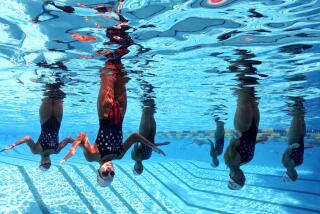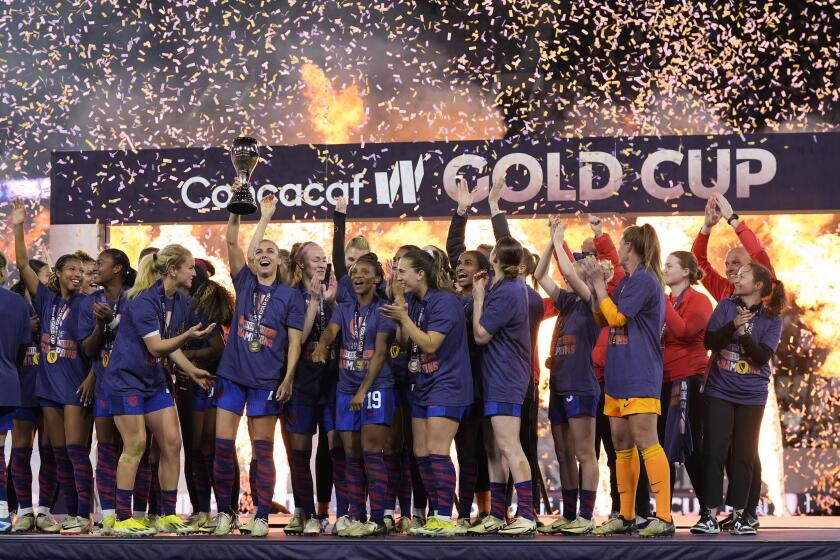THE SEOUL GAMES / DAY 4 : Notes : Guard’s Foot Fetish Didn’t Tickle Teske, West German Team
Police here were searching for an Olympic security guard who broke into the bedroom of West German marathon runner Charlotte Teske and disturbed her by playing with her feet.
The incident occurred in the early hours of Monday morning in the West German quarters in the athletes’ village.
Teske, 38, told officials she woke at 4 a.m. when she felt someone playing with her feet. She screamed and jumped from bed as the man escaped.
A West German official said: “She leaped into the elevator and took it down to the ground floor as he ran down the stairs. When she reached the ground floor, there was no guard to be seen but 2 accreditation cards were lying on the empty desk. She took the one of the man she recognized and handed it into officials. The man has not been seen since.”
Teske, who works as a children’s nurse in Darmstadt, West Germany, won the 1983 Boston Marathon and is the West German marathon champion.
Olympic moment: There was a nice moment in the Press Village Monday night, one of those that gives insight into what the Olympics are supposed to be about.
The South Korean men’s volleyball team, which had lost a five-set opener to Sweden after taking a two-set lead, had taken a two-set lead against the very strong Brazilian team, then lost the next two sets again.
So when the deciding set got under way, it attracted attention all around the village, especially from the South Korean workers. Soon, in one area of the village near the busy laundry, media people began to gather in front of a bank of television sets. As the score of the final set got closer, the crowd got larger.
With South Korea serving at match point, there were close to 75 journalists, chattering at each other in about a dozen different languages. And when South Korea won, the reaction was almost unanimous joy, even among some of the South Americans. The South Koreans in the gathering were so happy, so excited, that it was infectious.
The crowd dispersed slowly, the South Koreans bowing to all departees in a gesture of thanks for new-found friendship.
Add South Koreans: The first event here to trigger mass gatherings of South Koreans around the television sets took place Sunday night, when Chun Byung Kwan won the silver medal in the lightest weightlifting division, 52 kilograms. It was the first medal in the sport for South Korea, and it prompted sizable headlines. In fact, in the Korea Times, Chun’s feat prompted a joyous editorial cartoon with Chun and his medal.
Silent treatment: The official Cuban media have made no mention of the Seoul Olympics, the biggest Summer Games in history.
Standing in solidarity with North Korea, Cuba is 1 of 7 countries who have bypassed the Games. Cuba also boycotted the 1984 Los Angeles Olympics, as did most Soviet Bloc countries.
North Korea, which failed in its bid to be named co-host of the summer Olympics, ignored the opening of the Games on Saturday and later slammed them as divisive and dictatorial.
Cuba, meanwhile, is treating the Games as a non-event, despite the participation of a record 9,627 athletes from 159 countries. “It’s as if the Games simply did not exist,” said a Western diplomat who has been able to follow the events through foreign television feeds thanks to a satellite dish on the roof of his home.
Official television showed only old footage of fierce street demonstrations by South Korean students protesting against the Games.
President Fidel Castro said in January that “healthy and honorable conditions for Olympic Games would not exist under bullets, tear gas and the most ferocious repression of the people.”
Perry White would be proud: South Koreans are sticklers for protocol. Western reporters generally aren’t.
An episode Monday highlighted the difference. To ask questions of the U.S. women’s basketball team after its 87-81 victory over Czechoslovakia, reporters were asked to state their name and organization--a guideline rarely followed long into news conferences.
When Jere Longman of the Philadelphia Inquirer stepped to the microphone to ask his question, he didn’t identify himself and was interrupted by the volunteer, who asked him in halting English to state his name and newspaper.
“Jimmy Olson, Daily Planet,” Longman replied, referring to the cub reporter of “Superman” fame.
The room broke up. And the volunteer didn’t ask anyone else’s identity.
Pooling their talent: Although Matt Biondi and Troy Dalbey were the only swimmers representing the United States in the men’s 200-meter freestyle, 6 of the 8 finalists trained in the United States.
Besides Biondi and Dalbey, Artur Wojdat of Poland spent a couple of years working with Terry Stoddard at Mission Viejo; Australia’s Duncan Armstrong, who won the gold and set the world record, spent four months working with Mark Schubert at Mission Bay in Boca Raton, Fla.; Sweden’s Anders Holmertz, who won the silver, also spent four months with Schubert in Mission Bay; and West Germany’s Thomas Fahrner swam for USC for three years after the 1984 Olympics.
Fighting mad: The United States boxing team, off to a rocky start, is having some of its most fierce fights with NBC.
First, officials of the USA Amateur Boxing Federation were angry that the network showed numerous replays of Kelcie Banks being knocked unconscious Sunday night. Bad taste, they felt. Then, USA/ABF executive director Jim Fox hit the ceiling Monday when he learned that NBC reporter Wallace Matthews had gone into an athletes’ holding room and conducted an interview with distraught U.S. boxer Anthony Hembrick shortly after Hembrick had been declared a loser because he was too late for his bout.
“For NBC to stick a camera in that kid’s face at that moment--that was . . . and I’m going to talk to them about it,” he said. “There are restricted zones in this building, off limits to the media, and I’m going to make sure NBC stays out (of the athletes’ zone).”
The NBC cameraman was in the doorway, 8 to 10 feet from Hembrick. Matthews said he felt entitled to enter the room with a microphone when he saw Akbar Mohammed, who works for Las Vegas boxing promoter Bob Arum, in the room with Hembrick.
“What’s a pro boxing guy doing in there with one of our Olympic guys?” Matthews said. “He was all over Hembrick. When I saw that, I felt I had every right to be in there.”
Matthews said Monday he was told by USA/ABF press officer Leslie King that U.S. boxers had been told not to talk with NBC after their bouts.
Midway through Monday night’s boxing session, Matthews and King were seen engaged in a heated argument between the two rings.
Matthews reported that rumor had it Arum had offered U.S. head coach Ken Adams and his assistant coach, Hank Johnson, pro boxing jobs after the Olympics.
“Not true,” Johnson said. “It’s absolutely not true.”
More to Read
Go beyond the scoreboard
Get the latest on L.A.'s teams in the daily Sports Report newsletter.
You may occasionally receive promotional content from the Los Angeles Times.





